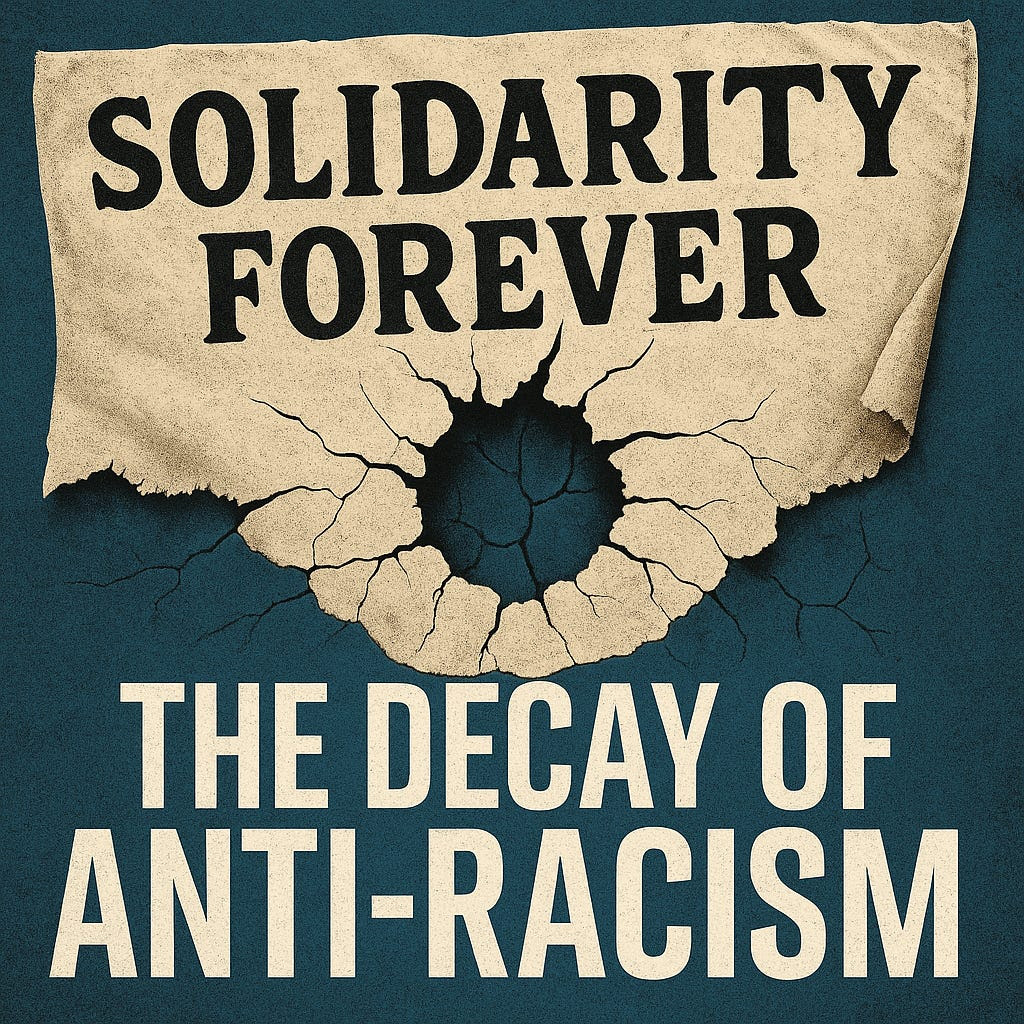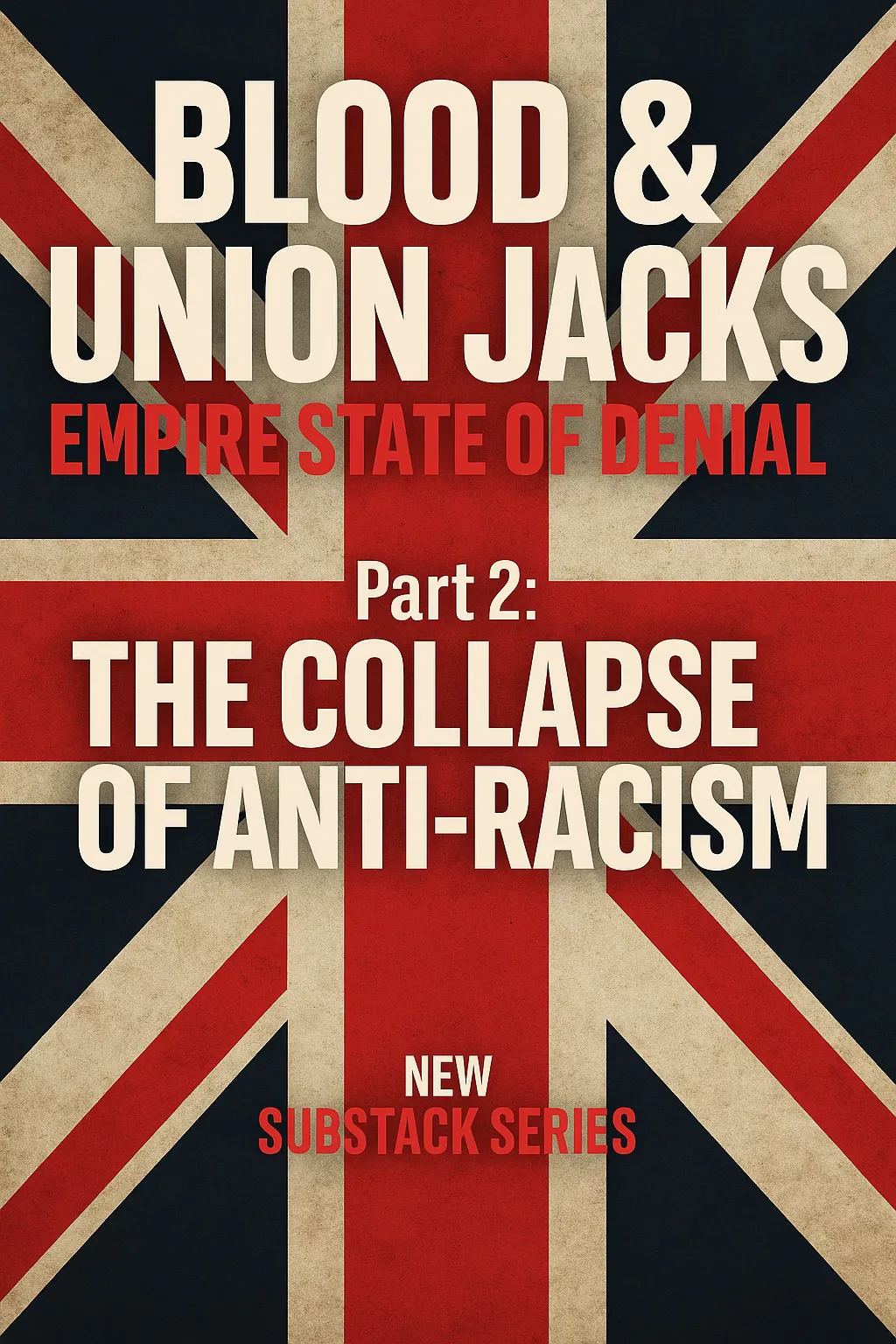Part Two: Corrosion and Capture
What we are living through is not the collapse of anti-racism, but its corrosion and capture. The institutions that once claimed to stand at the forefront of the struggle against racism — the trade unions, the Labour Party, and their satellites in the organised anti-racist movement — have been hollowed out. They still exist, still march, still release statements. But their moral authority has been drained, their credibility corroded, and their priorities captured by political managers who would rather perform opposition to racism than challenge it in any systemic way.
The result is a theatre of anti-racism. Carefully choreographed rallies and slogans, condemnations of fascism at the margins, but a studied silence about the structural racism that exists inside their own house.
Trade Unions: Collusion with Power
The trade union movement has a long history in the anti-racist struggle, and there are shining examples of leadership. The Public and Commercial Services Union (PCS) has been exemplary in defending its Black members, setting standards that others could emulate. But these bright spots are the exception. For too long, too many unions have been complicit in the very racism they claim to fight.

I have represented countless Black workers facing discrimination inside Labour-run councils and local authorities. Time and again, I have seen their cases dismissed not on the merits, but because their union representative was also a Labour councillor or party officer. The union, tied politically to the council, chose collusion over justice. Black workers were sacrificed to maintain political relationships.
In practice, Labour councils function as management. And unions, instead of defending their members against management racism, too often conspire with them to bury complaints. The worker is told their case stands no chance — not because it lacks evidence, but because pursuing it would embarrass the Party.
This is not anecdote. The TUC’s own 2017 report, Racism Ruins Lives, revealed that almost 70% of Black workers had experienced racial harassment at work, while more than half said their union had failed to support them adequately. The report detailed systemic patterns: grievances ignored, racist incidents downplayed, complaints lost in labyrinthine procedures. For Black workers, the union card in your pocket is no guarantee of solidarity.
And this rot goes to the top. Unions fund much of Britain’s formal anti-racist infrastructure, from Stand Up to Racism (STUR) to countless campaigns. They bankroll these movements, and in return, they demand political control. They decide what kind of racism is challenged and what kind is ignored. They mobilise around the grotesque theatre of Tommy Robinson, but fall silent about racism inside Labour councils, Labour boroughs, and even inside their own branches. The capture is total.
Labour’s Structural Betrayal
The corrosion does not end with the unions. The Labour Party itself has long since abandoned any real commitment to anti-racism, substituting instead a politics of performance.
The Labour Files revealed what many of us already knew: institutional racism is embedded in the Party’s culture. Complaints dismissed, Black members marginalised, activists targeted and undermined. It is a system designed to silence rather than to protect.
The treatment of Diane Abbott crystallises this contempt. Britain’s first Black woman MP, with decades of service and a record of leadership second to none, was suspended under the flimsiest of pretexts. Her career and reputation dragged through the mud while her Party looked the other way. That was not an act of neutral discipline. It was a signal, a blunt warning to every Black activist: your service means nothing, your leadership counts for nothing, your loyalty buys you no protection.
At the same time, Labour has adopted the rhetoric of the right. Starmer’s “island of strangers” comments revealed the Party’s true worldview: multiculturalism treated not as a strength but as a problem. He tried to walk it back, but the poison remains in the bloodstream of British politics. Labour’s embrace of “small boats” language, its performative outrage at asylum seekers, and its refusal to stand firmly against scapegoating has legitimised the far right. The Party that once claimed to defend migrants now competes with the Tories and Reform in criminalising them.
And on Windrush, the betrayal is total. Both the Prime Minister and the Home Secretary promised to fix the compensation scheme. Yet survivors still wait. Many have died waiting. Families remain in limbo. The injustice, exposed so brutally, has not been resolved. This is not accidental. It is malign neglect.
Even Labour’s commitment to amend the Race Relations Act has proved hollow. Instead of engaging with the leading Black organisations and institutions that have carried the struggle for decades, Labour has hand-picked compliant voices. They exclude independent Black leadership, preferring to seat at the table those who will not rock the boat. It is stage-managed diversity, designed for optics, not for justice.
The Double Betrayal
The consequence is a double betrayal.
Black communities face broken promises, performative politics, and the systematic erasure of their leadership. Racism in the workplace is denied, complaints are buried, and institutions are captured. The lived experience of racism is nowhere reflected in the official priorities of the anti-racist movement.
White working-class communities, particularly in the North, have been abandoned by Labour councils that have ruled their areas for decades. They have seen no material improvement, no serious regeneration, no end to managed decline. Their sense of betrayal is not manufactured. It is lived, generation after generation.
Parliament’s own research confirms the consequences. A 2024 POST briefing noted that trust in democracy is collapsing, with growing numbers of people convinced that the system no longer works for them. Disillusionment runs deep, especially in the communities that have seen Labour dominate for decades without delivering change.
And here lies the bitter irony. Both Black and white communities feel lied to. Both feel abandoned. Both are right. For different reasons, they share a deep disillusionment. And yet, instead of solidarity, they are divided, turned against each other by propaganda, misinformation, and scapegoating.
Consequences and the Vacuum
This corrosion of anti-racism has created a vacuum. Into that vacuum step Robinson, Farage, and Reform. They offer easy scapegoats, simple answers, and the thrill of certainty. They claim to be the voice of ordinary people, while in reality serving the billionaire class that funds them.
Meanwhile, Labour and the unions perform resistance, waving banners and passing resolutions, but refusing to tackle the rot inside their own house. They prefer slogans to substance.
The danger is clear. Unless we break this cycle, Britain will slide towards race riots, and worse. We stand at the edge of a race war, not because communities cannot coexist, but because the institutions that claim to defend them have abandoned their duty.
I speak as someone who has led these movements for decades. I have marched, campaigned, and fought within these structures. I know their strengths. I also know their limits. And today, those limits are not only clear — they are catastrophic.
Cliffhanger: Towards Part Three
What is needed now is not a managed anti-racism but a reborn one. Independent, honest, rooted in lived experience, and capable of uniting rather than dividing.
But this rebirth cannot succeed without confronting the battlefield of misinformation and disinformation. Because Robinson and Farage have learned to weaponise lies. They prey on the anger and disillusionment left by Labour and the unions, turning neighbour against neighbour, community against community.
If capture and corrosion are the disease, misinformation is th
Written by Lee Jasper, Chair APA





.png)




